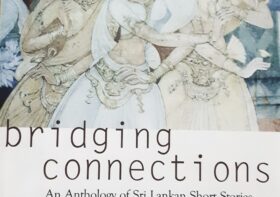Breaking the bow – Speculative Fiction based on Ramayana

కనగ కనగ కమనీయము, వినగ వినగ రమణీయము కదా, రామాయణం. రాముని కథ ఎన్నిసార్లు విన్నా మళ్ళీ మళ్ళీ వినాలనిపిస్తుంది. మళ్ళీ మళ్ళీ చెప్పుకోవాలనిపిస్తుంది. ఎందుకలా అనిపిస్తుందంటే, ఏమో, నాకు తెలీదు. అది రాముని మహిమో, వాల్మీకి ఘనతో. వాల్మీకి రాసిన కథను, కథలు కథలుగా ఇంకెంతో మంది చెప్పుకొచ్చారు. అవి ఇంకెందరి నోళ్ళల్లోనో నానాయి. కథలో ఒక్కో పాత్ర ద్వారానో, లేక ఆ పాత్ర వైపునుండో కథ చెప్పిస్తే, మరిన్ని కథలు. రామాయణం తరతరాలుగా మన consciousnessలో నిలిచిపోయిన కథ.
ఆ కథనే తీసుకొని, కొన్ని ఆసక్తికరమైన విభిన్న ప్రయోగాలు చేసి, వాటినో పుస్తకంగా వేశారు. దాని పేరు “Breaking the Bow”, sub-text “- “Speculative Fiction inspired by the Ramayana.” ముందు ఈ speculative fiction సంగతేంటో చూసి, అప్పుడు ధనుస్సు ఏ మాత్రం వంగిందో చూద్దాం.
పరిచయ వ్యాసంలో speculative fiction గురించి ఇలా చెప్పుకొచ్చారు:
“What makes a story speculative? A simple answer, not entirely accurate, is that a speculative story is non-realist story. In a realist story, the story’s context — the stuff that needn’t be told – is this world, the actual world, common-sense world. In a realist story, if two lovers meet in Navi Mumbai, the reader can be reasonably certain that they are meeting in Maharashtra, India. But in a non-realist story, there are no such guarantees. ‘Navi Mumbai’ could be a video game, the belly of a whale or the renamed capital of Sweden.”
Speculative Fiction మీద వికి పేజి కూడా ఎంతో కొంత ఐడియా ఇస్తుంది.
ఐఐటి కాన్పూర్లో జరిగిన ఏదో వర్క్-షాప్ లో వచ్చిన ఆలోచనను అమలుపరిచి, దేశవిదేశాల రచయితల కథలు ఉన్నాయి. అన్నింటిలోనూ రామాయణం అంతస్సూత్రంగా ఉంటుంది. ఒక కథలో(Kalyug Amended – Molshree Ambastha) , ప్రస్తుత కాలంలో, ఓ రాముడు తన సీతను రేప్ చేశారేమోనన్న అనుమానంతో విడాకులు ఇచ్చేస్తాడు. అప్పటికే ఆమె మూడు నెలల గర్భవతి. కాలెజిలో లెక్చరర్ ఉద్యోగం చేసుకుంటూ కవల పిల్లల్ని పెంచుకుంటుంటుంది. అప్పటికి ఆ రాష్ట్ర ముఖ్యమంత్రి అయిన రాముడు, ఆమెను వెతుక్కుంటూ వచ్చి, తానే పొరబడ్డానని, క్షమించమని అడుగుతాడు. ఆమె ఒప్పుకోదు. అతడు కోర్టుకెక్కుతాడు. మీడియావాళ్ళు పండుగ చేసుకుంటారు. చివరకు కోర్టులో తల్లి సంరక్షణలోనే పిల్లలు పెరగాలని, తండ్రిని వారంలో ఒకసారి కల్సుకోవచ్చుననీ తీర్పు ఇస్తుంది. కలియుగంలో పుట్టినందుకు సీత సంతోషిస్తుంది.
అన్ని కథలూ ఇంత సింపుల్గా ఉండవు. ఏమేమో జరుగుతాయి, ఎక్కడెక్కడో జరుగుతాయి, ఎవరికెవరికో జరుగుతాయి. థాయిలాండ్లో, అమెరికాలో, అండర్ వల్డ్ లో, ఎప్పుడో భవిష్యత్తులో, ఏదో గ్రహం మీద! అయినా కొన్ని కథలు అర్థమవుతాయి. కథలోని రాముడు మనిషైనా, లేదా ఒక concept అయినా, మొత్తానికి ఏదో అర్థవంతమైనదే జరుగుతుంది. కానీ కొన్ని కథల్లో మాత్రం కేవలం రామాయణంలో కొన్ని ముఖ్య పాత్రలనూ, కొన్ని ముఖ్య ఘటనలనూ తీసుకొని రాయడంవల్ల అవి ఈ పుస్తకంలో ఉన్నాయేమోగానీ, నిజంగా ధనుస్సు వంచడానికో, విరచడానికో పనికొచ్చే ప్రయత్నాలు కావని నాకు అనిపించింది.
ఇందులోని కథలను చాలామంది రాశారు. ఒక కథకూ ఇంకో కథకూ పొంతన లేకుండా ఉంటుందని ఆశించాను. కానీ, ఎక్కువ శాతం కథలు సీత చుట్టూ తిరిగాయి. పైన ఉదాహరించిన కథ కాకుండా, సీతను భవిష్యత్తులో empower చేసినట్టనీ, లేక మరోటనీ రాశారు. సీతను రాముడు అడవులకు తీసుకెళ్ళడం, సీతాపహరణ, సీతకు పెట్టిన అగ్నిపరీక్ష – వీటినే ఆధారంగా చేసుకున్న కథలు ఎక్కువగా ఉన్నాయనిపించింది. ఫిక్షన్ కాబట్టి, ఫాంటసీ హద్దులను పెంచుకుంటూ పోయి, కథను ఎంత వైవిధ్యభరితంగా చెప్పినా సరే, చివరకు కథలన్నీ ఒకటే గూటికి చేరుతున్నట్టుగా అనిపించింది. సీతలానే రిపీట్ మోడ్లో ఉన్న మరికొన్ని – శూర్పణఖ ఎపిసోడ్, హనుమంతుని భక్తి లాంటివి.
“Vaidehi and Her Mother”- Pratap Reddy రాసిన కథ మాత్రం సీతను గురించే అయినా నాకు బాగా నచ్చింది. ఇందులో కెనడాలో సెటిల్ అయిన ఒక రచయిత తాను రాసిన ఒక కథను గురించి చెప్పుకొస్తూ, అందులో ముఖ్యపాత్ర అయిన “మైథిలి”అన్న కథ ఎలా కొనసాగుతుందని మనకి మనకి చెప్తూ, ఎక్కడో, ఆ కాల్పనిక ప్రపంచంలోంచి బయటకొచ్చేసి, తన భార్య ఎలా మట్టిలో కల్సిపోయినదీ / లేక కలిపేసినది చెప్పేస్తాడు. నాకీ కథ నచ్చటానికి కారణం, ఒకటి టెక్నికల్గా ఈ కథను బాగా లాక్కురావడం అయితే, కంటెంట్ పరంగా సీతను ఉద్ధరించాలని చూడకుండా, the author simply lets her meet her fate.
“Sometimes I miss him. No, I will be honest; I miss him more than I miss anything else. There was no other living being with whom I could have had as intense a conversation; no one else could have matched me.
You think I had to kill for what he did against me and mine, or for what you call his evil? You are mistaken.
..
…
You see, Ravana was a man with a weak heart. His love for Sita was personal; his hatred of me was personal.
It is this that prevented him from winning.
I knew I would win, because he had a vulnerable heart. A heart that raged and pitied, thirsted and implored. A heart that could be pierced.”
Tabish Khair రాసిన “Weak Heart” కథలో రాముని స్వగతం ఇది. తాను God (the one with capital G.) అని ఒప్పుకుంటూనే తన existential crisis ను మనసు విప్పి చెప్పే కథ! 
“The Good King” (Abha Dawesar) రాసిన కథలో రావణుడు ఓ హైటెక్ సామ్రాజ్యానికి అధినాయకుడు. లక్ష్మణుడు ముక్కు కోసేశాడని సూర్ఫణక అన్నకు చెప్పినప్పుడు:
“Where were you when he attacked?”
“I’m not sure. I was playing on that new hybrid-reality machine you built, but then the landscape looked so good I decided to parachute into a swathe of forest from the game for the real feel of things. He was quite beautiful — though his brother was more beautiful still.”
సీతను ఎత్తుకొచ్చాక:
“Personally, he had felt a little cheap in the previous Ramayanas when he had been forced to resort to sleight of hand to deceive people. Deception. How he loathed that word! It was this disgust that had propelled his interest in mathematics, physics, neuroscience, geophysics. Moreover, he was sick of the Ramayana, at least of the parts that involved him. He was interested in putting another one out there in the future, one that Sita and he actually lived. He could have replaced the traditional epic in every e-reader and audio book with his own version — in a few years no one would even suspect that it had been changed — but Ravana wanted truth and reality over magic and maya. Sita and he would live it first. Authentically.”
నాకు ఈ కథలన్నింటిలోనూ విపరీతంగా నచ్చి, నేను పుస్తకం బ్రౌజ్ చేసి పక్కకు పడేయడం కాకుండా, కొని తెచ్చుకొని చదివానంటే కారణం ఒక కథ. దాని పేరే చాంతాడంత పెద్దగా ఉంటుంది. “The Ramayana as an American Reality Show: Internet Activity Following the Mutilation of Surphanaka.” ఉఫ్. Kuzhali Manickavel రాసిన ఈ కథలో టైటిల్లో చెప్పినట్టుగా, ఆ రియాల్టీ షో ఎపిసోడ్ అవ్వగానే ఇంటర్నెట్లో హల్చల్ అంతా ఉంటుంది. Dark humour. Story of our lives, our digital lives. చదవాల్సిన కథ, at least for the way it was executed.
అద్భుతః అనిపించేలా కొన్ని వాక్యాలూ, సీన్సు ఉన్నాయి ఈ కథల్లో. కాకపోతే, అన్ని కథల్లోనూ లేవు. But overallగా, కథలను ఇష్టపడేవాళ్ళు ప్రయత్నించదగ్గ పుస్తకం ఇది. అయితే, రామాయణాన్ని ఇలాంటి భిన్నకోణాలనుండి చూసే ఆసక్తి కూడా ఉండాలి. అది లేకపోతే, ఈ కథలన్నీ attempts of blasphemyగా అనిపించచ్చు. రాముడు ఏదైనా అవ్వచ్చు – దేవుడు, మనిషి లేక మర. దానికి సిద్ధపడితే, కొన్ని మంచి కథలని, కొన్ని మంచి ప్రయత్నాలనీ ఆస్వాదించచ్చు, అభినందిచచ్చు.
Review of the book, in The Hindu.
Fiction
Zubaan
2012
Paperback
338




pavan santhosh surampudi
//అది నిజమా? కాదా? అని వాదులాడుకోవడం కాదు, what a story made us feel inside అన్నది ముఖ్యం. ఎంత విభిన్నమైనవి మనకి అనుభవంలోకి వచ్చేలా చేస్తే, అవి గొప్పగా రాయబడ్డా, లేకపోయినా, మనతో నిలిచిపోయే కథలు అవుతాయని నా నమ్మకం.//
true true true.